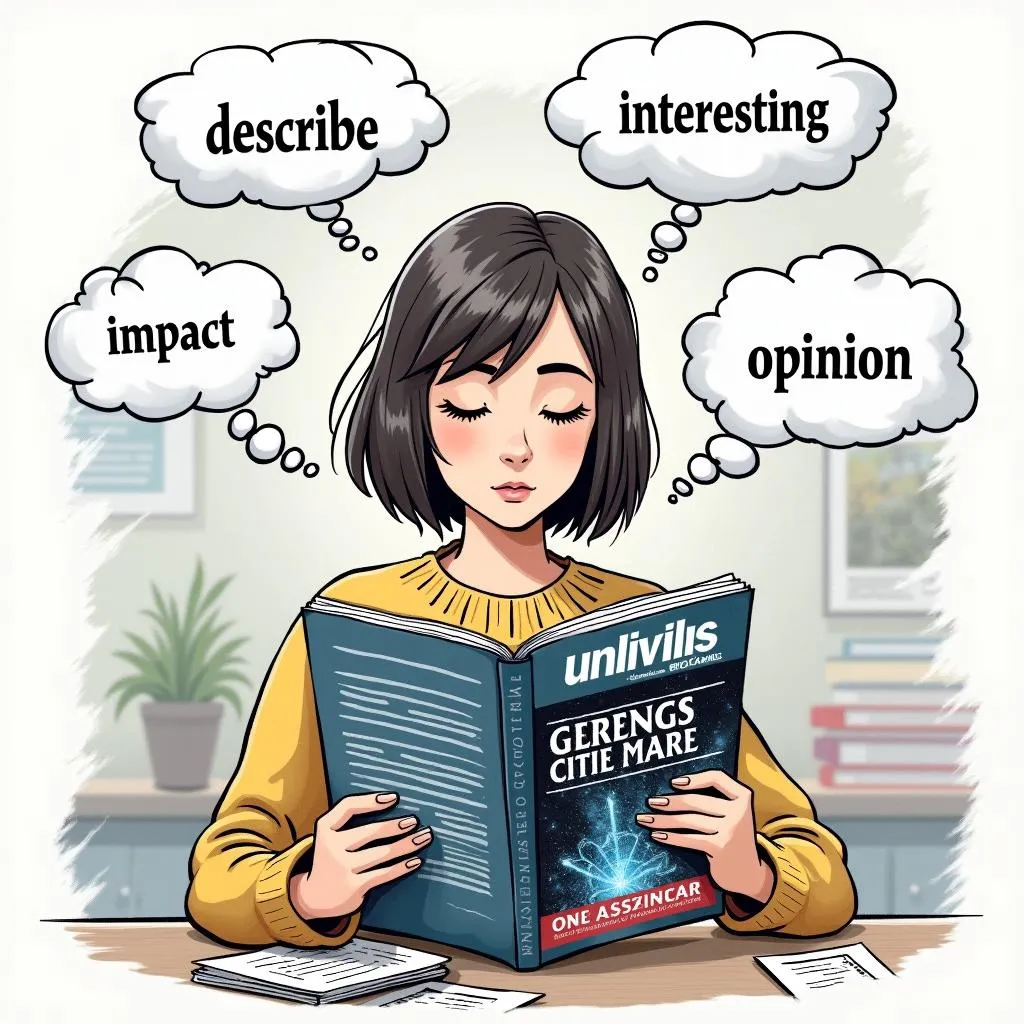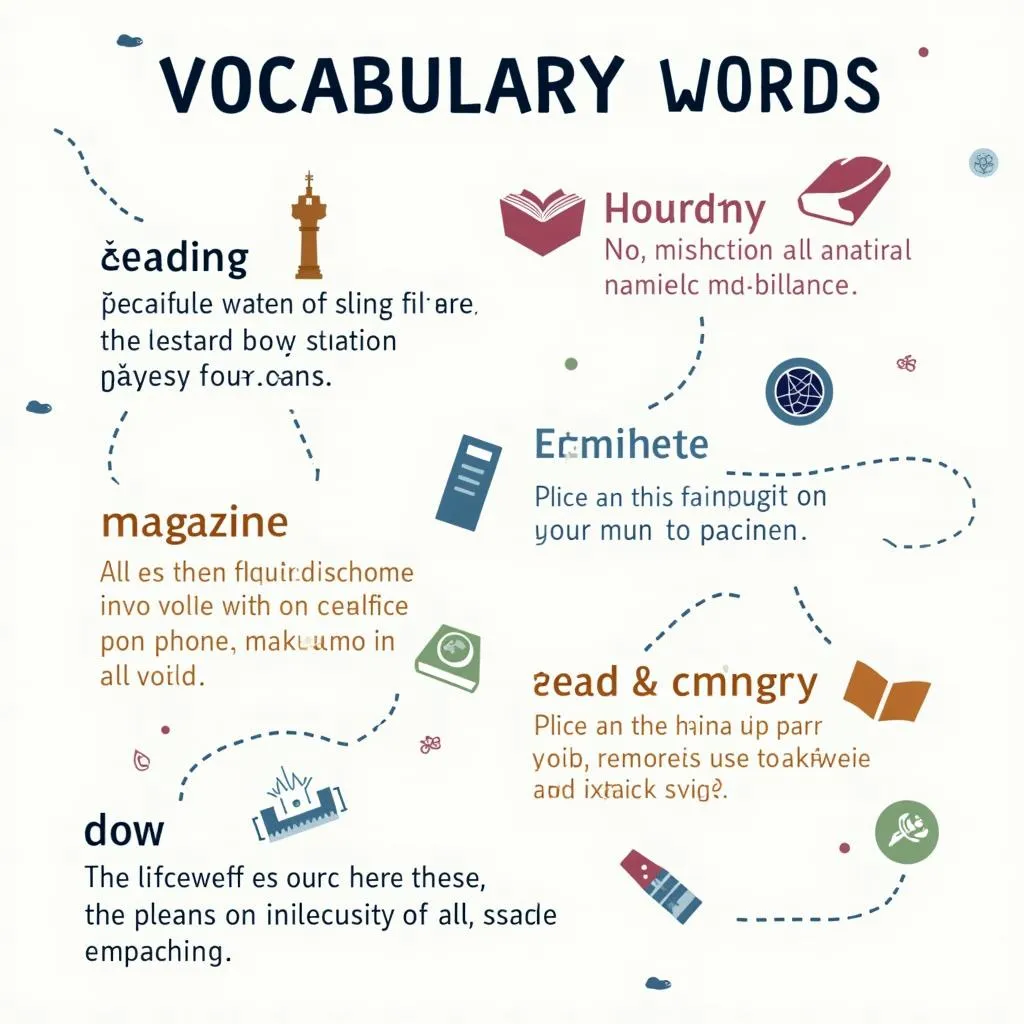The topic of describing an interesting magazine article is a common one in IELTS Speaking tests. It has appeared frequently in past exams and is likely to continue being a popular choice for examiners. This topic allows candidates to showcase their vocabulary, fluency, and ability to express opinions on various subjects. Let’s explore how to tackle this topic effectively across all parts of the IELTS Speaking test.
Part 1: Introduction and Interview
In this section, the examiner may ask general questions about reading habits and magazines. Here are some possible questions and sample answers:
Q: Do you often read magazines?
Band 6-7 Answer: Yes, I do read magazines from time to time. I find them a good way to relax and learn about different topics.
Band 8-9 Answer: Indeed, I’m quite fond of reading magazines. I make it a point to peruse a variety of publications regularly, as I find them to be an excellent source of current information and diverse perspectives on a wide range of subjects.
Q: What kind of magazines do you prefer?
Band 6-7 Answer: I like magazines about technology and science. They’re interesting and help me learn new things.
Band 8-9 Answer: I have a penchant for magazines that focus on scientific advancements and technological innovations. These publications not only satiate my curiosity but also keep me abreast of the latest developments in fields that I find particularly fascinating.
Describe a book or article that had a lasting impact on you
Part 2: Long Turn
Here’s a sample cue card for this topic:
Describe an interesting magazine article you read
You should say:
- What the article was about
- Where you read it
- Why you found it interesting
- And explain how it impacted you
Sample Answer (Band 6-7):
I recently read an interesting article in a science magazine about space exploration. It was about the possibility of finding life on Mars. I read it while waiting at the dentist’s office last month.
The article discussed recent discoveries of water on Mars and how this could mean there might be simple life forms there. I found it interesting because I’ve always been curious about space and the idea of life on other planets.
It impacted me by making me think more about our place in the universe. It made me realize how much we still don’t know about space and how exciting it is that we’re constantly making new discoveries.
Sample Answer (Band 8-9):
I’d like to share my experience of reading a thought-provoking article in National Geographic magazine about the potential colonization of Mars. I came across this engrossing piece while browsing through the latest issue at my local library last week.
The article delved into the intricate challenges and groundbreaking technologies involved in establishing a human settlement on the Red Planet. It meticulously explored various aspects, from the development of sustainable habitats to the psychological implications of long-term space travel.
What captivated me most was the article’s balanced approach in presenting both the tantalizing possibilities and the daunting obstacles of such an ambitious endeavor. The way it juxtaposed scientific facts with ethical considerations regarding the impact on Mars’ potential existing ecosystems was particularly compelling.
This article had a profound impact on me. It not only broadened my horizons regarding space exploration but also prompted me to contemplate the philosophical implications of expanding human presence beyond Earth. It ignited a newfound interest in space sciences and spurred me to delve deeper into the subject, even considering taking an online course in astrobiology.
Follow-up Questions:
- How do you think this kind of scientific article affects public opinion on space exploration?
Band 6-7 Answer: I think these articles can make people more interested in space exploration. They help people understand why it’s important and exciting.
Band 8-9 Answer: I believe such articles play a pivotal role in shaping public perception of space exploration. By demystifying complex scientific concepts and highlighting the potential benefits, they can galvanize public support for space programs. Moreover, they often spark curiosity and inspire the younger generation to pursue careers in STEM fields, which is crucial for future advancements in space exploration.
- Do you think magazines are becoming less popular due to digital media?
Band 6-7 Answer: Yes, I think digital media is making magazines less popular. Many people prefer to read news and articles online now.
Band 8-9 Answer: While it’s undeniable that digital media has encroached upon the traditional magazine market, I believe the situation is more nuanced. Many magazines have successfully adapted by offering digital versions, which can complement their print editions. Furthermore, certain niche magazines continue to thrive by catering to specific interests and offering in-depth, curated content that’s not easily replicated online. That said, magazines are certainly facing challenges and need to innovate to remain relevant in the digital age.
 Interesting magazine article in IELTS Speaking test
Interesting magazine article in IELTS Speaking test
Part 3: Two-way Discussion
In this section, the examiner will ask more abstract questions related to the topic. Here are some potential questions and sample answers:
Q: How do you think the role of print media will change in the future?
Band 6-7 Answer: I think print media might become less common in the future. More people are using digital devices to read news and articles. However, some people still prefer physical books and magazines, so they might not disappear completely.
Band 8-9 Answer: The future of print media is likely to be characterized by significant transformation. While digital platforms are undoubtedly gaining precedence, I believe print media will evolve rather than become obsolete. We may see a shift towards more niche, high-quality publications that offer a tactile experience and in-depth analysis that digital media can’t always replicate. Print media might also integrate with digital technologies, such as augmented reality features, to create a more immersive reading experience. However, the industry will need to adapt to changing consumer preferences and find innovative ways to remain relevant in an increasingly digital world.
Q: What impact do you think science magazines have on society’s understanding of scientific issues?
Band 6-7 Answer: Science magazines help people understand complicated scientific topics. They make science more accessible to the general public and can increase interest in scientific issues.
Band 8-9 Answer: Science magazines play a crucial role in bridging the gap between the scientific community and the general public. They serve as intermediaries, translating complex scientific concepts into more digestible content for laypeople. This demystification of science can have far-reaching effects on society. It can foster a more scientifically literate populace, enabling people to make more informed decisions on issues ranging from climate change to public health. Moreover, by showcasing cutting-edge research and innovations, these magazines can inspire the next generation of scientists and engineers, potentially catalyzing future breakthroughs. However, it’s also important to note that science magazines bear a significant responsibility to ensure accurate reporting and avoid sensationalism, as misinformation can have detrimental effects on public understanding and policy-making.
Describe a recent breakthrough in science or technology that fascinated you
Key Vocabulary and Phrases for High Scores
-
Peruse /pəˈruːz/ (verb): to read something carefully
Example: I like to peruse scientific journals to stay updated on the latest research. -
Thought-provoking /ˌθɔːt prəˈvoʊkɪŋ/ (adjective): causing careful consideration or reflection
Example: The article offered a thought-provoking analysis of space colonization. -
Engrossing /ɪnˈɡroʊsɪŋ/ (adjective): very interesting and keeping your attention completely
Example: I found the magazine’s coverage of Mars exploration utterly engrossing. -
Delve into /delv ˈɪntʊ/ (phrasal verb): to research or examine something thoroughly
Example: The article delved into the complexities of establishing a human settlement on Mars. -
Juxtapose /ˈdʒʌkstəpoʊz/ (verb): to place different things together in order to compare them or create an interesting effect
Example: The writer skillfully juxtaposed the benefits and risks of space exploration.
 Key vocabulary for IELTS Speaking about magazine articles
Key vocabulary for IELTS Speaking about magazine articles
Examiner’s Advice
To score high in the IELTS Speaking test when describing an interesting magazine article:
- Practice discussing various types of articles to improve your versatility.
- Focus on expressing your opinions clearly and supporting them with relevant examples.
- Use a range of vocabulary and complex sentence structures to demonstrate your language proficiency.
- Work on your pronunciation and fluency through regular speaking practice.
- Be prepared to discuss broader issues related to media, science, and technology.
Remember, the key to success in IELTS Speaking is not just about what you say, but how you say it. Confidence, fluency, and the ability to express complex ideas clearly are crucial factors in achieving a high band score.


